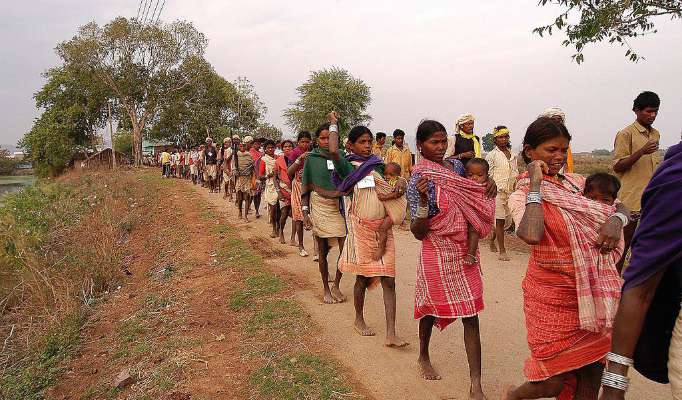The Supreme Court of India has ordered the forced eviction of more than one million Adivasi and other forest-dwelling households from forestlands across 16 states after the government failed to defend a law protecting their rights. The final country-wide numbers of forced evictions are likely to rise substantially as other states are forced to comply with the court orders. The court’s orders came in a case filed by wildlife groups questioning the validity of the Forest Rights Act. The petitioners had also demanded that all those whose claims over traditional forestlands are rejected under the law should be evicted by state governments as a consequence.
The Union government failed to present its lawyers in defence of the law on February 13, leading a three-judge bench of Arun Mishra, Navin Sinha and Indira Banerjee to pass orders giving states till July 27 to evict tribals whose claims had been rejected and submit a report on it to the Supreme Court. The written order was released on February 20.
The court said that the state governments would “ensure that where the rejection orders have been passed, eviction will be carried out on or before the next date of hearing. In case the eviction is not carried out, as aforesaid, the matter would be viewed seriously by this Court.” The next date of hearing is set for July 27 – the effective date by when states would have to evict tribals to comply with the court orders.
The Forest Rights Act, which was passed during the Congress-led United Progressive Alliance’s first tenure, requires the government to hand back traditional forestlands to tribals and other forest-dwellers against laid down criteria. The Act, passed in 2006, has seen opposition from within ranks of forest officials as well as some wildlife groups and naturalists.
The last time country-wide evictions took place was in 2002-2004, again triggered by a Supreme Court order, which led to many cases of violence, deaths and protests in the central Indian tribal forested areas and uprooting of around 300,000 households, notes researcher C R Bijoy in his published research.
Adivasi rights activist Gladson Dungdung said in a Facebook post,
“13 February 2019 has become a black day for the Adivasis of India. Interestingly, an upper caste person filed a case in the Supreme Court and three upper caste judges took decision to through out 1.1 million Adivasis out of their abodes the forests. On 5 January 2011 the SC in its historical decision, said that 8% Adivasis/Tribes/scheduled Tribes are the first settlers and owners of the country and rest 92% people are decscedants of immigrants or invaders. Therefore, a billion dollar question is that how can the invedors take decision to through out the first settlers from their territory? This decision has been taken with a clear intension to grab the land, territory and resources of the Adivasis. Therefore, we must be united and fight back to protect our land, territory and resources. Jai Adivasi!”
Human Rights defender Stan Swamy said in a Facebook post,
“SC orders forced eviction of more than 1 million (ten lakhs) tribals, forest-dwellers
Court gives states till July 27 to evict tribals based on a petition filed by wildlife groups questioning the validity of the Forest Rights Act.
Question that arises …
- Why did govt lawyers absent themselves from the hearing ?
- Why did not govt lawyers defend the Forest Rights Act, 2006 ?
- Is the life of Adivasis and other forest-dwellers less valuable than the aesthetic pleasure of ‘wild-life lovers’ who are mostly urban middle-class ?”






